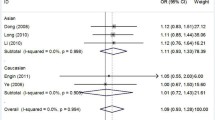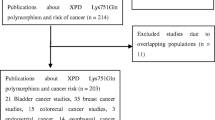Abstract
The xeroderma pigmentosum group D (XPD) and human 8-oxoguanine glycosylase 1 (hOGG1) genes have been suggested to play an important role in the pathogenesis of hepatocellular carcinoma (HCC). However, the results have been inconsistent. In this study, we performed a meta-analysis to clarify the associations of polymorphisms of XPD and hOGG1 genes with HCC risk. Published literature from PubMed, EMBASE, and Chinese National Knowledge Infrastructure were retrieved. Pooled odds ratio (OR) with 95 % confidence interval (CI) was calculated using a fixed- or random-effects model. Seven studies (1,955 HCC cases and 2,023 controls) for XPD Lys751Gln polymorphism and six studies (1,470 HCC cases and 1,541 controls) for hOGG1 Ser326Cys polymorphism were included in the final meta-analysis. For XPD Lys751Gln polymorphism, no significant association was found under all genetic models (Gln/Gln vs Lys/Lys OR = 1.09, 95 % CI = 0.28–4.18; Gln/Lys vs Lys/Lys OR = 1.41, 95 % CI = 0.81–2.44; dominant model OR = 1.40, 95 % CI = 0.77–2.57; recessive model OR = 1.02, 95 % CI = 0.33–3.23). For hOGG1 Ser326Cys polymorphism, there was a significant association of this polymorphism with HCC risk under heterogeneous codominant model (OR = 1.38, 95 % CI = 1.01–1.88) and dominant model (OR = 1.57, 95 % CI = 1.14–2.16). The sensitivity analysis indicated that the significant association between hOGG1 Ser326Cys polymorphism and HCC risk was not robust. The present meta-analysis has limited evidence to support the association of XPD Lys751Gln and hOGG1 Ser326Cys polymorphisms with HCC risk. Further, large-scale studies with the consideration for gene–gene/gene–environment interactions should be conducted to investigate the association.



Similar content being viewed by others
References
Raza SA, Clifford GM, Franceschi S. Worldwide variation in the relative importance of hepatitis B and hepatitis C viruses in hepatocellular carcinoma: a systematic review. Br J Cancer. 2007;96:1127–34.
Gao J, Xie L, Yang WS, Zhang W, Gao S, Wang J, et al. Risk factors of hepatocellular carcinoma—current status and perspectives. Asian Pac J Cancer Prev. 2012;13:743–52.
Benhamou S, Sarasin A. ERCC2/XPD gene polymorphisms and cancer risk. Mutagenesis. 2002;17:463–9.
Shen M, Hung RJ, Brennan P, Malavielle C, Donato F, Placidi D, et al. Polymorphisms of the DNA repair genes XRCC1, XRCC3, XPD, interaction with environmental exposure, and bladder cancer risk in a case–control study in Northern Italy. Cancer Epidemiol Biomark Prev. 2003;12:1234–40.
Xu L, Wu Y, Jin Y, Yu Y, Qian G. A case–control study on polymorphism of DNA repair gene XPD and susceptibility to hepatocellular carcinoma. Tumor. 2004;24:526–9. in Chinese.
Chen CC, Yang SY, Liu CJ, Lin CL, Liaw YF, Lin SM, et al. Association of cytokine and DNA repair gene polymorphisms with hepatitis B-related hepatocellular carcinoma. Int J Epidemiol. 2005;34:1310–8.
Xie W. Association between the nucleotide excision repair (NER) genes polymorphisms and genetic susceptibility and clinical phenotype of hepatocellular carcinoma. Doctoral Dissertation of Guangxi Medical University 2007; 1–103. in Chinese.
Long XD, Ma Y, Zhou YF, Yao JG, Ban FZ, Huang YZ, et al. XPD codon 312 and 751 polymorphisms, and AFB1 exposure, and hepatocellular carcinoma risk. BMC Cancer. 2009;9:400.
Cui X, Su H. A case–control study on the polymorphism of gene XPD and the susceptibility of primary hepatic carcinoma. Med J Chin People’s Health. 2010;22:912–4. in Chinese.
Gulnaz A, Sayyed AH, Amin F, Khan AU, Aslam MA, Shaikh RS, et al. Association of XRCC1, XRCC3, and XPD genetic polymorphism with an increased risk of hepatocellular carcinoma because of the hepatitis B and C virus. Eur J Gastroenterol Hepatol. 2012. doi:10.1097/MEG.0b013e328359a775.
Hu H, Zhang C, Deng W, Huang Q, Dong X, Wang C, et al. Study on the familial aggregation factors of hepatocellular carcinoma. Yiyao Qianyan. 2012;2:143–4. in Chinese.
Boiteux S, Radicella JP. The human OGG1 gene: structure, functions, and its implication in the process of carcinogenesis. Arch Biochem Biophys. 2000;377:1–8.
Weiss JM, Goode EL, Ladiges WC, Ulrich CM. Polymorphic variation in hOGG1 and risk of cancer: a review of the functional and epidemiologic literature. Mol Carcinog. 2005;42:127–41.
Zhang H, Hao B, He F. Studies on association between susceptibility of hepatocellular carcinoma and genetic polymorphism Ser326Cys of DNA repair gene hOGG1. Chin J Clin Oncol. 2005;32:841–3. in Chinese.
Sakamoto T, Higaki Y, Hara M, Ichiba M, Horita M, Mizuta T, et al. hOGG1 Ser326Cys polymorphism and risk of hepatocellular carcinoma among Japanese. J Epidemiol. 2006;16:233–9.
Wang A, Cong W, He X, Jia H, Jin X, Zhu G, et al. A hOGG1 gene polymorphism and genetic susceptibility to colorectal cancer and hepatocellular carcinoma. Chin J Gastroenterol Hepatol. 2008;17:854–7. in Chinese.
Ji L, Zeng X, Li L, Chou X, Chen S, Yu H. Interaction between the single-nucleotide polymorphism of DNA repair gene hOGG1 and HBV infection and its susceptibility to hepatocellular carcinoma. J Hyg Res. 2011;40:705–8. in Chinese.
Tang G, Li X, Liu T, Yang J, Luo J, Liang Z. Genetic polymorphisms of DNA repair genes in patients with hepatocellular carcinoma. Shandong Med J. 2011;51:19–20. in Chinese.
Yuan T, Wei J, Luo J, Liu M, Deng S, Chen P. Polymorphisms of base-excision repair genes hOGG1 326cys and XRCC1 280His increase hepatocellular carcinoma risk. Dig Dis Sci. 2012;57:2451–7.
DerSimonian R, Laird N. Meta-analysis in clinical trials. Control Clin Trials. 1986;7:177–88.
Mantel N, Haenszel W. Statistical aspects of the analysis of data from retrospective studies of disease. J Natl Cancer Inst. 1959;22:719–48.
Begg CB, Mazumdar M. Operating characteristics of a rank correlation test for publication bias. Biometrics. 1994;50:1088–101.
Egger M, Davey Smith G, Schneider M, Minder C. Bias in meta-analysis detected by a simple, graphical test. BMJ. 1997;315:629–34.
Yuan T, Deng S, Liu H, Liu M, Chen P. Relationship between XRCC1 and XPD polymorphisms and the risk of the development of hepatocellular carcinoma: a case–control study. Exp Ther Med. 2012;4:285–90.
Long XD, Ma Y, Zhou YF, Ma AM, Fu GH. Polymorphism in xeroderma pigmentosum complementation group C codon 939 and aflatoxin B1-related hepatocellular carcinoma in the Guangxi population. Hepatology. 2010;52:1301–9.
Mi Y, Zhang L, Feng N, Wu S, You X, Shao H, et al. Impact of two common xeroderma pigmentosum group D (XPD) gene polymorphisms on risk of prostate cancer. PLoS One. 2012;7:e44756.
Zhu S, Zhang H, Tang Y, Wang J. Polymorphisms in XPD and hOGG1 and prostate cancer risk: a meta-analysis. Urol Int. 2012;89:233–40.
Xue H, Lu Y, Lin B, Chen J, Tang F, Huang G. The effect of XPD/ERCC2 polymorphisms on gastric cancer risk among different ethnicities: a systematic review and meta-analysis. PLoS One. 2012;7:e43431.
Li BR, Zhou GW, Bian Q, Song B. Lack of association between the hOGG1 Ser326Cys polymorphism and gastric cancer risk: a meta-analysis. Asian Pac J Cancer Prev. 2012;13:1145–9.
Duan XL, Gong H, Zeng XT, Ni XB, Yan Y, Chen W, et al. Association between XPD Asp312Asn polymorphism and esophageal cancer susceptibility: a meta-analysis. Asian Pac J Cancer Prev. 2012;13:3299–303.
Yuan H, Niu YM, Wang RX, Li HZ, Chen N. Association between XPD Lys751Gln polymorphism and risk of head and neck cancer: a meta-analysis. Genet Mol Res. 2011;10:3356–64.
Liu J, Cao XL, Zhang Z, Lei DP, Jin T, Yu XM, et al. HOGG1 Ser326Cys polymorphism and susceptibility to head and neck cancer: a meta-analysis. Asian Pac J Cancer Prev. 2011;12:2491–4.
Feng Z, Ni Y, Dong W, Shen H, Du J. Association of ERCC2/XPD polymorphisms and interaction with tobacco smoking in lung cancer susceptibility: a systemic review and meta-analysis. Mol Biol Rep. 2012;39:57–69.
Zhong D, Li G, Long J, Wu J, Hu Y. The hOGG1Ser326Cys polymorphism and increased lung cancer susceptibility in Caucasians: an updated meta-analysis. Sci Rep. 2012;2:548.
Pabalan N, Francisco-Pabalan O, Sung L, Jarjanazi H, Ozcelik H. Meta-analysis of two ERCC2 (XPD) polymorphisms, Asp312Asn and Lys751Gln, in breast cancer. Breast Cancer Res Treat. 2010;124:531–41.
Yuan W, Xu L, Feng Y, Yang Y, Chen W, Wang J, et al. The hOGG1 Ser326Cys polymorphism and breast cancer risk: a meta-analysis. Breast Cancer Res Treat. 2010;122:835–42.
Acknowledgments
The work was funded by the Zhejiang Medicine, Health, and Science (no. 2010KYB127), Zhejiang Province Chinese Medicine Research Program (2012ZA130), and Zhejiang Gong Yi Xing Technology Application Project (2012C33025).
Conflicts of interest
None
Author information
Authors and Affiliations
Corresponding author
Additional information
The Publisher and Editor retract this article in accordance with the recommendations of the Committee on Publication Ethics (COPE). After a thorough investigation we have strong reason to believe that the peer review process was compromised.
An erratum to this article can be found online at http://dx.doi.org/10.1007/s13277-017-5487-6.
An erratum to this article is available at http://dx.doi.org/10.1007/s13277-017-5487-6.
About this article
Cite this article
Zhang, RC., Mou, SH. RETRACTED ARTICLE: Polymorphisms of excision repair gene XPD Lys751Gln and hOGG1 Ser326Cys might not be associated with hepatocellular carcinoma risk: a meta-analysis. Tumor Biol. 34, 901–907 (2013). https://doi.org/10.1007/s13277-012-0625-7
Received:
Accepted:
Published:
Issue Date:
DOI: https://doi.org/10.1007/s13277-012-0625-7




